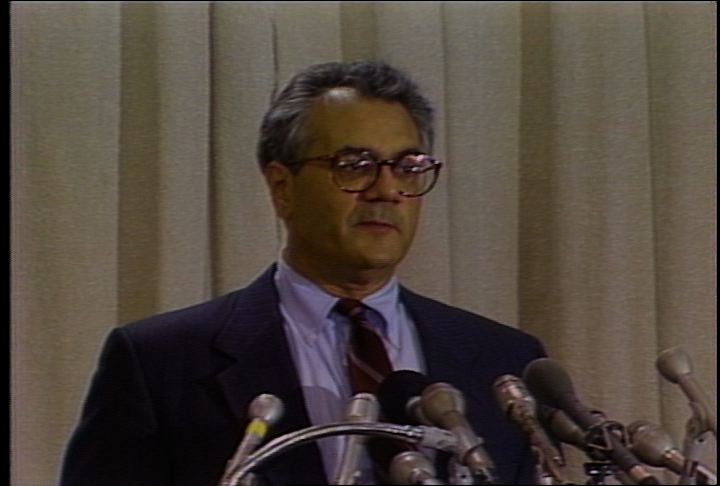
Description:
Hope Kelly reports that Barbara Arnwine, the Executive Director of the Lawyers' Committee for Civil Rights, is filing a lawsuit against the city of Boston, the Boston Housing Authority (BHA), and the department of Housing and Urban Development (HUD) on behalf of public housing tenants in Boston. Mayor Ray Flynn has announced an agreement aimed at eradicating discriminatory housing practices, but Arnwine considers the agreement inadequate because it does not acknowledge that African American families were "victims" of discrimination. Arnwine says that the city of Boston and the BHA lied to African American families and that the BHA worked to keep housing projects segregated. Press conference held by Flynn, Doris Bunte (BHA), and Robert LaPlante (HUD). Interview with Arnwine in her office at the Lawyers' Committee for Civil Rights. She says that the city of Boston, the BHA, and HUD do not want to accept responsibility for the harm done to African American tenants and that, despite the difficulty of the struggle, racial equality is worth fighting for. Kelly reviews Arnwine's career as an activist and lawyer. Kelly's report also features footage of African American and white children playing outside of public housing projects and footage of African American students entering a Boston high school. This edition of the Ten O'Clock News also included the following item: Carmen Fields reports on nomination papers for Bill Owens and Royal Bolling, Sr.
1:00:16: Visual: Shot of the exterior of the offices of the Lawyers' Committee for Civil Rights. An African American woman sits at a desk at the front of the offices. The woman answers the phone. Footage of Barbara Arnwine (Executive Director, Lawyers' Committee for Civil Rights) being interviewed by Hope Kelly. Arnwine says that the city of Boston, the Boston Housing Authority (BHA), and the Department of Housing and Urban Development (HUD) do not want to face up to the harm they have caused to African American residents of public housing in Boston. Shot of Arnwine signing a business letter. Kelly reports that Arnwine is bringing a lawsuit against the city of Boston, the BHA, and HUD on behalf of tenants of public housing in Boston. Kelly reports that Ray Flynn (Mayor of Boston) has announced an agreement aimed at correcting the discriminatory housing practices of the past; that Arnwine believes the agreement to be inadequate. V: Shot of Flynn, Doris Bunte (BHA), and Robert LaPlante (HUD) entering a press conference in June of 1988. Footage of Arnwine in her office, being interviewed by Kelly. Arnwine says that the agreement does not acknowledge that African American families were the "victims" of discrimination; that the agreement calls the families "disadvantaged." Arnwine says that the African American families were injured by the discriminatory housing policy. Arnwine says that African American families were misled and lied to by the city and the BHA. Arnwine says that African American families were not placed in white housing projects because of their race. Shots of African American children outside of a housing project building; of white children playing with a garden hose outside of a housing project building in South Boston. Footage of Arnwine saying that some white families were also victims of discrimination; that white families were discouraged from living in primarily African American housing projects. Arnwine says that the BHA was engaged in an effort to keep public housing projects segregated. Shot of the name plaque on the door of Arnwine's office. Shots of Arnwine working in her office. Kelly reports that Arnwine grew up in a segregated housing project in Detroit. Kelly reports that the Lawyers' Committee for Civil Rights was involved in the struggles to desegregate the fire department, the police department, and the schools in Boston. V: Shots of a poster in the Lawyers' Committee offices. The poster has a caption reading, "I have a dream. . . ." Shots of Arnwine talking on the telephone in her office. Kelly notes that the Lawyers' Committee for Civil Rights filed the original school desegregation suit against the Boston School Committee in 1972. V: Shots of African American students entering a high school in Boston. Footage of Arnwine being interviewed by Kelly. Kelly asks if the housing discrimination suit can be compared to the school desegregation suit. Arnwine says that housing integration means that people of different races become neighbors. Arnwine says that housing integration represents change; that change is often met by resistance; that some people might get hurt in the resulting struggle. Arnwine says that it was difficult for the African Americans who first integrated the police department and the schools; that integration has a price. Arnwine says that racial equality is worth fighting for. Shots of Boston police officer taking an oath; of African American students entering Charlestown High School.
Date Created:
06/21/1988






















































